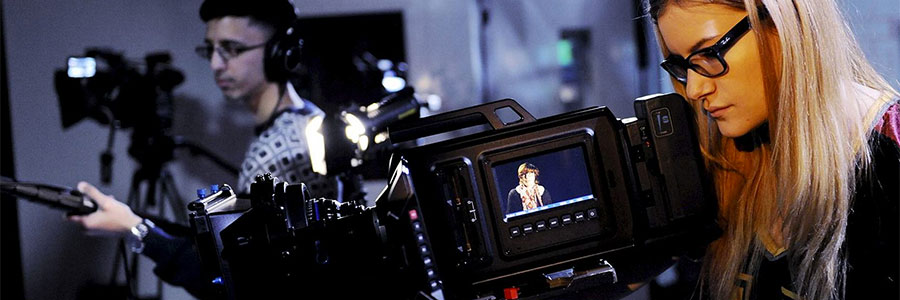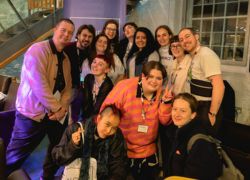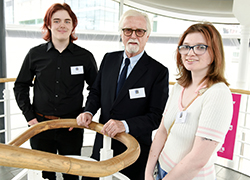Course overview
Film and television showreel
Enjoy some highlights from projects created by our graduating film and television students.
You learn the practical aspects of film and television production, and film in our industry-standard facilities, which includes two television studios, a fully operational radio station, digital film production equipment, and grading and edit suites. We have our very own award-winning multimedia platform – TUXtra – which showcases content produced by students and volunteers across the university, including live broadcasts.
You work on live briefs from industry contacts including BBC, Channel 4 and ITV Signpost, ensuring that you hone your skills within real-life environments. Supported by our dedicated technical staff, you become familiar with a range of filmmaking disciplines, experiencing working as part of a media production team. Throughout your studies you create a range of work, broadcasting it through TUXtra and exploring the industry to find exactly where your skills fit.
This course includes a foundation year - ideal if you need additional preparation or if you don't have sufficient grades to join Year 1 of a degree.
Top reasons to study film and TV production at Teesside University:
- Industry links that launch careers: our partnership with ITV Signpost opens the door to exciting real-world opportunities. From working on live briefs and industry-led projects – such as The One Show and documentary collaborations – to internships, technical bootcamps and employability support, you gain valuable experience and professional connections.
- Career ready: our partnership with ITV Signpost opens the door to exciting real-world opportunities. From working on live briefs and industry-led projects – such as The One Show and documentary collaborations – to internships, technical bootcamps and employability support, you gain valuable experience and professional connections.
- Student satisfaction: 94.4% of media studies students agreed that staff were good at explaining things (National Student Survey 2024, tees.ac.uk/source.)
- State-of-the-art facilities: get hands-on with professional-grade equipment including digital cameras with motion control rigs, green screen sound stages, broadcast studios and more – all supported by expert technicians.
- A thriving creative hub: our campus sits at the centre of a growing broadcasting community, with the BBC and other major players investing in the North East’s creative industries.
- Financial support: you may be eligible to apply for a range of scholarships including our Franc Roddam scholarship and our Marston Scholarship (excluding those applying to the foundation year).
- Powered by Adobe and Apple: we’re Europe’s first Adobe Creative Campus and an Apple Distinguished School (2024–2027) – the only UK university to hold both titles. This gives you access to cutting-edge tools and platforms to elevate your creative potential.
Creative UK
 Take advantage of our Creative UK membership and help futureproof your career, with networking events, a resource hub to support professional development, and bespoke workshops in partnership with industry leaders and mentors. Sign up for free student membership to get opportunities, events and newsletters sent directly to your inbox.
Take advantage of our Creative UK membership and help futureproof your career, with networking events, a resource hub to support professional development, and bespoke workshops in partnership with industry leaders and mentors. Sign up for free student membership to get opportunities, events and newsletters sent directly to your inbox.
Course details
Course structure
Foundation year core modules
Explore media fundamentals, including the making of images, video, sound and audio-visual materials. You learn skills in risk assessment for technical equipment, use of digital software and online resources and practical skills in making. Alongside practical sessions, you study professional environments, media theories, critical analysis and audience perspectives. Working with a group, you tackle a brief to develop a creative piece where you are encouraged to experiment and take creative risks.
This is a 40-credit module.
Create original ideas and concepts for your individual project, creating an artefact, report, campaign, comic, product or other form related to the arts, design and media industries. You explore the context and history of the creative arts and use this to inform your project. Learning to research and analyse ideas about art, design and media, you develop your understanding of creative working and the relationship between creativity, society and the environment.
This is a 40-credit module.
Learn the fundamentals of storytelling and its historical, social, cultural and political contexts in relation to media such as TV, marketing, music and writing. Explore visual, audio and written examples of narrative form and construction. You enhance your understanding of the use of plot, themes, character, point of view, visual representation, audio-visual blending, storyboarding, non-linear story and prose. You are guided to develop a story form relevant to your chosen discipline/creative practice.
This is a 20-credit module.
Develop key study skills in preparation for starting your degree, including critical thinking, teamwork, research and delivering presentations. You are introduced to primary and secondary research sources and shown how to use the virtual learning environment (VLE). You also find out about the wide range of student support and learning resources on campus.
This is a 20-credit module.
Year 1 core modules
Enhance your skills in team-working, communication, project management and negotiation. You collaborate with a group of your course mates to produce a small-scale creative project in response to a subject-specific brief.
This is a 20-credit module.
Introduction to Film and Television Production: Key Craft Principles and Skills
You are introduced to the practical fundamentals of film and TV production and creative visual storytelling, exploring screenplay structure and key elements of theme, character and plot. Examine the relationship between script, filming and post-production, and produce a treatment and short-form script based on your creative ideas. Through workshops and studio sessions, learn to use key skills within the industry, including the use of industry-standard cameras, lighting, sound and post-production software, to help realise elements of your script. You are introduced to the television studio and occupy roles such as director, camera operator, floor manager and vision mixer.
This is a 40-credit module.
Introduction to the Creative Industries
With many opportunities in the creative industries sector, learn how to start on your career path while developing vital employability skills such as networking and digital presence. Understand the structure of the sector and the interdisciplinary relationships between art, design and media. Discover how the sector operates locally, nationally and globally – debating the role of policy and the importance of sustainability.
This is a 20-credit module.
Screen Cultures: Visual Methods and Critical Responses
Study the core principles, visual grammar and aesthetics central to the creation of meaning in film and television. By combining theory, history and practice, you explore critical concepts, ideas and provocations and consider different modes of storytelling, authorship, content production and audiences. Analyse film and television, key themes and cultural issues emerging across the industry.
This is a 40-credit module.
Year 2 core modules
Advanced Storytelling and Production Specialisms: From Script to Screen
Critically and contextually explore the difference between short-form drama and non-fiction content. Working in small production teams, you move from initial ideas development, towards the scripting, production and post-production of your projects. You create two short films – a documentary or a short form non-fiction, produced in response to a set thematic brief, and a short drama which is a critical response to your initial non-fiction short. Gain a practical understanding of the director role, including the theories and critical contexts of film direction and the legalities of working with talent and participants in the film and TV industry. Experience the differing roles inherent to the production process, honing specialisms in directing, producing and production management, sound recording, script writing and editing. You engage with peer feedback and critical reflection within your working teams.
This is a 40-credit module.
Develop critical thinking and analysis skills, exploring contemporary issues and debates related to the creative industries. You research a specific area or development within your chosen subject – this may be technical, economic, ethical, legal, cultural, sociological, or a combination. You draw on appropriate academic and industry sources to contextualise your research. You present your topic and initial research within taught sessions, providing an opportunity for peer and tutor feedback.
This is a 20-credit module.
You develop and explore, in depth, a creative industry-based project in your specialist area of design, art, media, music, photography or illustration - relevant to your future professional practice. While forming a professional portfolio of work, you experience real-world business scenarios and challenges, industry competitions and cross and inter-disciplinary activities. You gain skills in project management, applied research methods and collaborative creative work.
This is a 40-credit module.
Working in the Creative Industries
There are many challenges facing contemporary art, design and media practices. You research the social, political or ecological challenges around us to generate a small-scale project. You develop and reflect on your understanding of enterprise in the context of the creative industries. Contextualise your own professional practice and aspirations through application of critical thinking and problem-solving skills.
This is a 20-credit module.
Optional work placement year
You have the option to spend one year in industry learning and developing your skills. We encourage and support you with applying for a placement, job hunting and networking.
You gain experience favoured by graduate recruiters and develop your technical skillset. You also obtain the transferable skills required in any professional environment, including communication, negotiation, teamwork, leadership, organisation, confidence, self-reliance, problem-solving, being able to work under pressure, and commercial awareness.
Many employers view a placement as a year-long interview, therefore placements are increasingly becoming an essential part of an organisation's pre-selection strategy in their graduate recruitment process. Benefits include:
· improved job prospects
· enhanced employment skills and improved career progression opportunities
· a higher starting salary than your full-time counterparts
· a better degree classification
· a richer CV
· a year's salary before completing your degree
· experience of workplace culture
· the opportunity to design and base your final-year project within a working environment.
If you are unable to secure a work placement with an employer, then you simply continue on a course without the work placement.
Final-year core modules
You produce a self-managed, individual extended piece of independent investigation and/or creative production or portfolio of work. Supervised by an academic member of staff, you take responsibility for the planning and execution of the work, including the consideration of associated legal, social, ethical and professional issues. You explore in depth a chosen subject area, demonstrating your ability to analyse, synthesise and creatively apply your learning, showing critical and evaluative skills and professional awareness.
This is a 60-credit module.
Plan and implement your departure from education to your first or new career, or to further study. You continue your creative practice, developing a portfolio and/or extended piece of work which reflects you as a creative. You explore discipline-specific employability strategies, and engage and network with industry to develop key connections.
This is a 60-credit module.
Modules offered may vary.
How you learn
You learn through industry standard creative practice and modules which expand cultural and industry knowledge. You use state-of-the-art media facilities to produce media of the highest standard. You also use packages of digital materials accessed through our virtual learning environments to help speed up the learning journey.
How you are assessed
Our Disability Services team provide an inclusive and empowering learning environment and have specialist staff to support disabled students access any additional tailored resources needed. If you have a specific learning difficulty, mental health condition, autism, sensory impairment, chronic health condition or any other disability please contact a Disability Services as early as possible.
Find out more about our disability services
Find out more about financial support
Find out more about our course related costs
Entry requirements
Entry requirements
Any combination of level 3 qualifications. Each application is considered on a case-by-case basis.
We may also be able to help you meet the entry requirements through our Summer University short courses.
For general information please see our overview of entry requirements.
Are you an international student looking for a foundation course offering both academic and English language content? Explore your options with our International Study Centre.
International applicants can find out what qualifications they need by visiting Your Country.
You can gain considerable knowledge from work, volunteering and life. Under recognition of prior learning (RPL) you may be awarded credit for this which can be credited towards the course you want to study.
Find out more about RPL
Employability
Career opportunities
Previous students have gone on to work at BBC, ITV and major production studios such as Pinewood.
Information for international applicants
Qualifications
International applicants - find out what qualifications you need by selecting your country below.
Select your country:
Useful information
Visit our international pages for useful information for non-UK students and applicants.

 BA (Hons) Film and Television Production
BA (Hons) Film and Television Production  BA (Hons) Film and Television Production
BA (Hons) Film and Television Production  BA (Hons) Film and Television Production
BA (Hons) Film and Television Production











 Creative students went behind the scenes of renowned film festival
Creative students went behind the scenes of renowned film festival Teesside University lecturer joins call to action in Parliament
Teesside University lecturer joins call to action in Parliament Ambitious Teesside University students welcome positive impact of scholarships
Ambitious Teesside University students welcome positive impact of scholarships